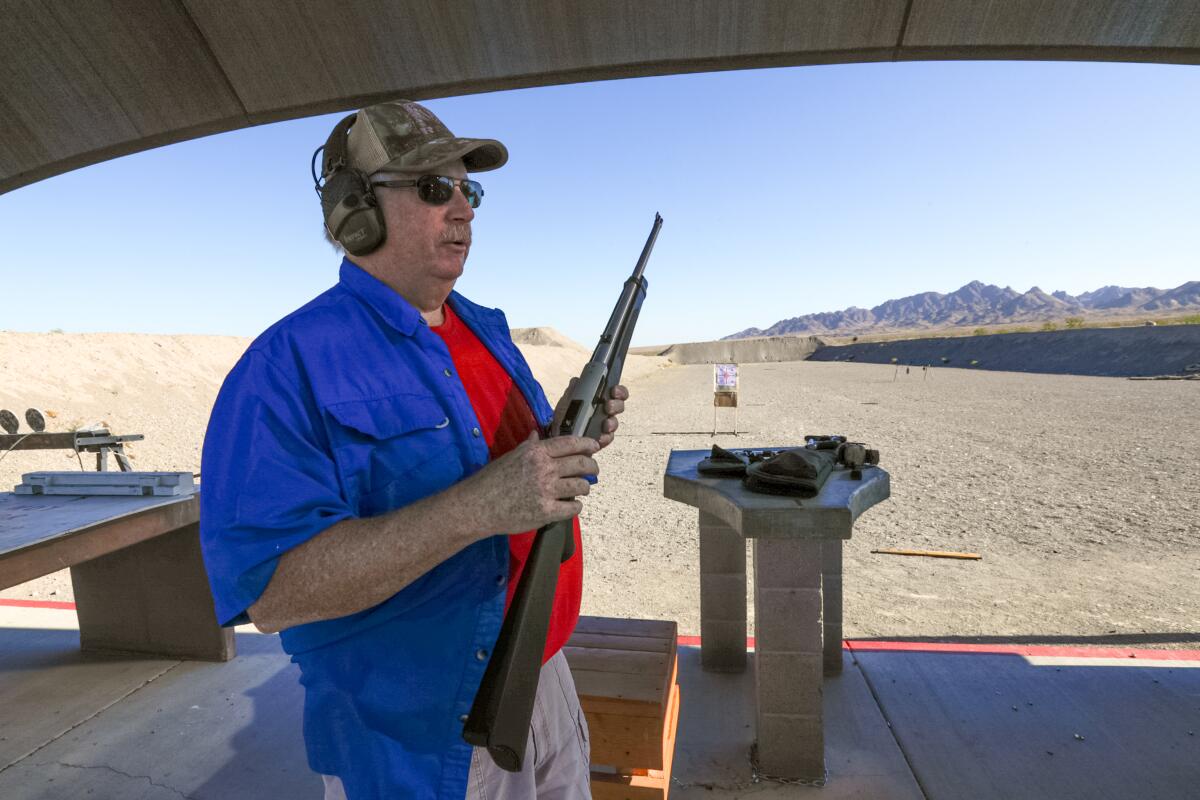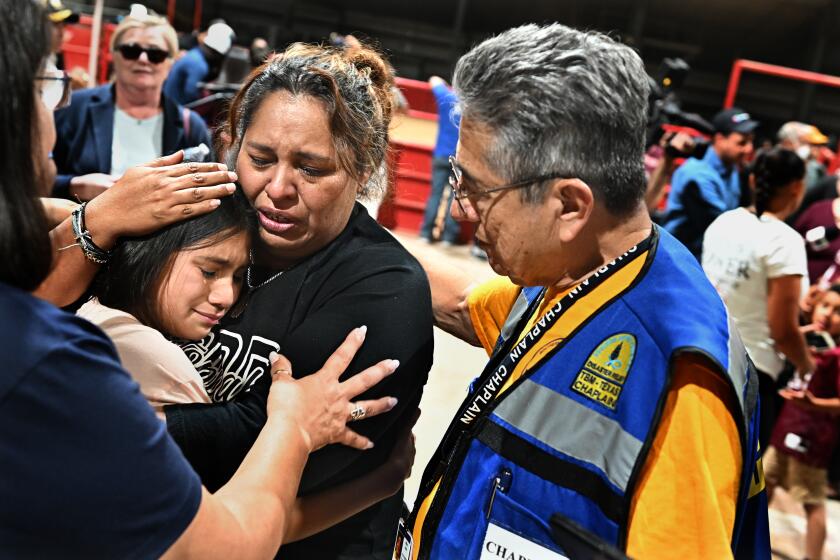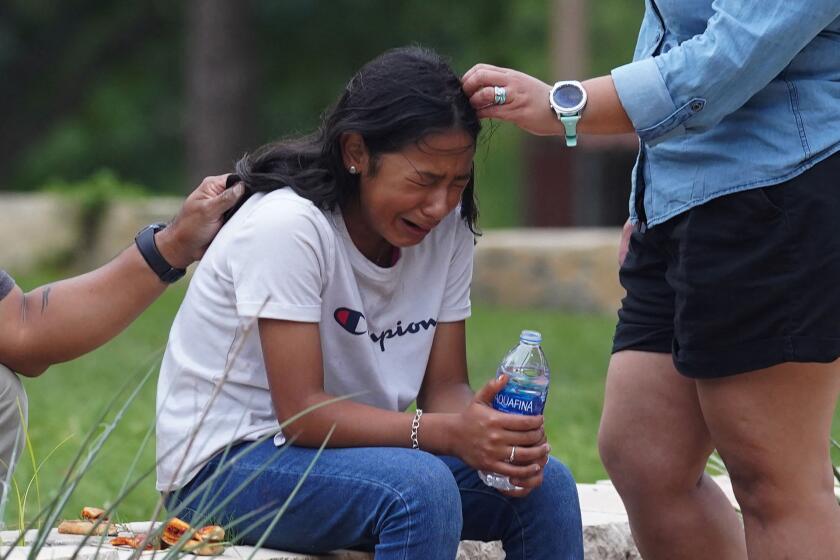Column: Trump’s judges are coming for California’s gun laws. Can we stop them?

- Share via
SACRAMENTO — The front page of Thursday’s edition of the Uvalde Leader-News was a solid black box, broken only by the date of the mass shooting that killed 19 little kids and two teachers: May 24, 2022.
The front page of the Los Angeles Times also bore a black box, this one filled with the names of the dead.
We are out of words.
Worse, we may be running out of options to control AR-15s and other high-powered firearms in California, and across the nation, because conservative judges are poised to return to a Wild West era of gun rights. As in, anything goes.
“Wake up, folks,” Gov. Gavin Newsom warned a room full of journalists at the Capitol on Wednesday. “Read the opinions. Pay attention to what’s going on.”
The media had been called to the Capitol dome for a last-minute jab-back at Texas Gov. Greg Abbott, who earlier that morning slammed California’s gun laws as ineffective. That’s my take, anyway. The event turned out to be little more than a photo opportunity and a chance for a visibly angry Newsom to vent about his nemesis. But his remarks about the judiciary were pointed and unflinching.
The greatest threat to controlling guns in the Golden State is “extremist judges,” Newsom warned, even as he promised to sign a dozen new gun laws if the Legislature passes them. Without a doubt, some will end up challenged in court, in front of those Federalist Society justices, many appointed by Trump, who are intent on pulling the U.S. as far right as possible.
Newsom particularly name-checked a Trump appointee to the 9th Circuit Court of Appeals, Judge Ryan D. Nelson, who wrote a recent 2-1 decision that found unconstitutional California’s ban on allowing anyone under the age of 21 to have an assault weapon. My personal favorite bit of reasoning in that opinion was this justification for why teenagers have a right to semiautomatic rifles:
“Semiautomatic rifles are able to defeat modern body armor, have a much longer range than shotguns and are more effective in protecting roaming kids on large homesteads, are much more precise and capable at preventing collateral damage, and are typically easier for small young adults to use and handle,” Nelson wrote.
OK, then. Little hands need big guns. Got it.
As to collateral damage, the Uvalde shooter seems to have craved more of it, not less. Newsom mused about, “how Judge Nelson is feeling, wondering how proud he is of that opinion he wrote.”
Uvalde survivors’ stories: One fourth-grader said the shooter came into his classroom and said, ‘It’s time to die.’
But Nelson isn’t the worst crisis facing California gun laws. UCLA professor and constitutional law scholar Adam Winkler told me the gap is closing between the court version of the 2nd Amendment and the “aspirational” 2nd Amendment romanticized by the 1776 patriot types.
The Supreme Court, Winkler said, is “supersizing” the 2nd Amendment.
Within weeks, that court will rule on a case out of New York about who has the right to carry weapons in public. Many fear the ultraconservative majority that now controls the court is about to answer that with a resounding “pretty much everybody.”
What follows may be a cascade of other gun-rights cases attacking our ability to regulate weapons, similar to what is expected with the recent ruling gutting abortion rights — further attacks on privacy rights such as access to contraception and same-sex marriage.
If the court does make a broad ruling on concealed-carry rights, which the case is about, everything we need to know about gun regulation could shrink down to, as experts describe it, text, history and tradition — basically empowering the last four words of the 2nd Amendment: A well regulated Militia, being necessary to the security of a free State, the right of the people to keep and bear Arms, shall not be infringed.
Age restrictions? Shall not be infringed. High-capacity magazines? Shall not be infringed. Waiting periods? Shall not be infringed.
If that sounds alarmist, consider what Stanford law professor John Donohue, an expert on gun laws, has to say. “All those laws are in peril,” he told me, if the court decides they want to go that far.
Donohue is slightly hopeful that the trio of recent mass shootings in Buffalo, Laguna Woods and Uvalde could give Chief Justice John G. Roberts Jr. a little leverage to help “control his somewhat wayward colleagues.”
But, he added, “There are five of them, and if they don’t want to be controlled, they can do a lot of damage.”
What does that do to California, which thankfully has some of the nation’s most infringing laws when it comes to guns?
Recent mass shootings have spurred new calls for gun regulations. Experts say the opposite is happening.
Our state would be one of the hardest hit by a broad court ruling, and it would send a signal to the lower courts, such as Nelson’s 9th Circuit, that striking down gun safety laws is welcomed.
Combined with the refusal of craven Republicans to pass gun safety legislation at the federal level, that leaves California in a legal throw-it-at-the-wall-and-see-what-sticks limbo. Remember when we filed three bazillion lawsuits against Trump? Kind of like that. Maybe some of it works, maybe it just slows the whole thing down.
That ethos can already be seen in one of this year’s key pieces of gun control legislation, Senate Bill 1397, a somewhat bonkers idea modeled after the Texas abortion law that would allow private citizens to file civil suits against those they suspect are illegally manufacturing, distributing, transporting, importing or selling assault weapons, .50 BMG rifles, ghost guns or ghost gun kits.
That proposal is probably legally sound and serves the dual purpose of tweaking Texas and somewhere down the line forcing the Supreme Court to decide if what’s good for the goose is good for the gander when it comes to vigilante justice. But it has some experts wondering exactly who would want to sue a potentially violent gun runner without the protection of law enforcement.
Perhaps it will inspire a reality show, with some Fresno bounty hunter searching out basement dealers for the cash reward. Or as Donohue imagined, maybe “some former military folks could set up a company that has some deal, ‘If you have any problem with a neighbor call us, we’ll take care of them,’ ” he half-joked.
It may be a sign of desperation that California is even contemplating such measures. But it is shrewd.
State Sen. Nancy Skinner (D-Berkeley), who wrote our precedent-setting red flag law in 2016, which allows family members and law enforcement to petition courts for the removal of guns from people deemed a public danger, told me outside Newsom’s news conference that, “we are just going to be more and more creative ... on how to protect the things we think are essential, right, moral things to do.”
She wants to find ways to go after the manufacturers, who have been shielded by federal law. Gun sales are higher than ever, she points out.
California can only do so much to change the national status quo — including near-weekly massacres — even as the National Rifle Assn. and its bootlickers keep winning. The state’s opponents are well-armed with their stacked courts and spineless political pawns.
But we have California ingenuity — rooted in the knowledge that failure means more death.
More to Read
Sign up for Essential California
The most important California stories and recommendations in your inbox every morning.
You may occasionally receive promotional content from the Los Angeles Times.













